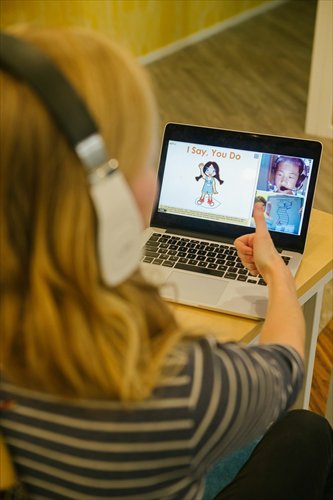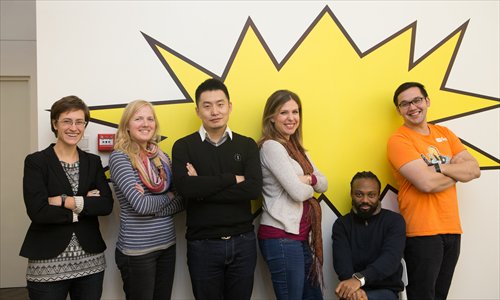Remote learning
Connecting Chinese youngsters with a global elementary school education
Leo couldn't wait to turn on the laptop. Putting on the earphones, the 6-year-old boy sat sprightly at his desk at home, preparing for an online, one-on-one English language lesson. In the computer window that popped up, was his English teacher, teaching remotely from home in the US.
"It was great that Leo could interact with a native English teacher at an American primary school via computer cameras and the Internet," said Leo's father Zhang Chun, 36, who works for a telecommunications company in Beijing.
Chinese parents always want their children to learn English from native speakers because they believe this is more effective and authentic. Some send their children to overseas summer camps, some spend a fortune on an international school, while others pay for afterschool English classes. An increasing number of online English education platforms have started bringing the combination of native English teachers and Western teaching methods to the homes of Chinese children.
In November 2013, the Beijing Municipal Commission scrapped English as a compulsory course of the curriculum for grades one and two at public primary schools. However, the reforms haven't settled the nerves of parents who hope their children will win from the "starting point."

The online platform enables American teachers to remotely tutor Chinese students. Photo: Li Hao/GT
Certified teachers only
Leo likes learning English. When he was four years old, he started attending face-to-face English classes.
During the 25-minute lesson of VIPKID, a Chinese startup company that allows Chinese children to "attend American primary school at home," Leo was taught color vocabulary using phonics, a teaching method used in Western elementary schools for children to learn English.
"We tried the online one-on-one class to experience how teachers in the US would teach," said Zhang.
"There is a demand from Chinese parents for the best native English teachers around the world. However, few of the foreign teachers located in China are serious, certified teachers," said Cindy Mi, founder of VIPKID. "Chinese children don't get the teachers they deserve."
The online platform, according to Mi, helps solve a problem that concerns the majority of Chinese parents - affordable and convenient access to a quality international education.
Mi said the foreign teachers they recruit must either have a bachelor's degree or a teacher's certificate. A Canadian or American nationality is also required, as the teaching materials used by the company are developed in accordance with the Common Core States Standards (CCSS) of the US. [The CCSS pairs with the K12 education system, providing guidelines as to what a certain grader should be able to do in terms of language, math, and social science.]
On the other hand, the online education platform offers more career opportunities to teachers overseas to increase their income and share their experiences with children in need.
In the comfort of her home in Cincinnati in the US, Kate Chrisitan met her Chinese students on the other side of the Pacific Ocean, for the first time. When she turned on her computer one day in September, she was surprised to be greeted with mooncakes made by a student.
"I wish I could have eaten them!" said 46-year-old Chrisitan. A certified elementary school teacher, she has 16 years of classroom teaching experience in schools in the US, the UK and a number of international schools. Before she joined VIPKID, Chrisitan was looking for a way to work from home so that she could homeschool her daughter.
According to Mi, teachers' salaries in the US are not very high. An elementary school teacher earns around $3,000-4,000 per month. But many teachers don't want to leave their homeland because their lives are well established with families, pets, cars and houses. They also don't want to lose their pension benefit after retirement.
"Teachers are paid $ 12-13 for the lesson which lasts about half an hour. Many teachers can earn $ 1,000 a month," said Mi.

Foreign teachers are invited to design the online English curriculum for Chinese children. Photo: Li Hao/GT
Online vs classroom teaching
Apart from remote online courses, smartphone apps and WeChat have also been developed for children to learn English.
Vivian Leonard, an Irish teacher working in Beijing who has lived in the US and Germany, is experienced in using a smartphone app to interact with her students. At First Leap where Leonard teaches, the app is an important complement for classroom teaching. The school provides English classes for children aged between 3 and 10.
"In the app I contact my students and record books so they can see the pages of the book and listen to my voice," said Leonard, who started tutoring Chinese children in 2012 while doing her master's degree in Beijing.
"For example, recently we had a contest 'Happy Spelling,' and I recorded each word the students needed to learn and uploaded it to the app, so they could listen to my voice spelling the word and pronouncing it, and look at the picture of the item."
But Leonard said that online education is only one way of complementing the learning experience. Children need to go to a classroom to communicate with teachers and classmates to strengthen their cognitive abilities.
Localized international education
While some English teaching programs boast a CCSS curriculum, others design their courses according to international school standards.
In Leonard's opinion, English teaching to Chinese children should always take into account what children have been taught in public schools, and then match this with the requirements from the US, the UK, Ireland and other countries.
She said when her family moved from Germany to the US, her sister was in second grade. She came home crying every day because she knew everything they were teaching her at the new school. Her sister then skipped a grade and it was much better. However, in 2007 when her family moved to Shanghai from the US, her sister, who was a straight A student in the US, had to go back a year when she went to an international school, because she could not keep up.
"In China, she had to work harder," said Leonard.
Happy or hard learning?
In past years, many Chinese parents have been stuck with the dilemma of whether to give their children a "happy" education or a "hardworking" one.
Debbie Whitaker-Volturo, who taught fourth grade for 35 years in Ocean City in the US, said she was shocked by how hard a Chinese student works after she started teaching for VIPKID.
"After the class with me on the weekend, [Chinese children] would then go to two other three-hour classes. Where I live, many students spend the weekends playing sports and doing leisure activities."
She was also surprised by the length of the Chinese school day. "At my school, students go to school from 7:40 until 14:40. I have heard that many Chinese children go to school until 6 at night and then they might have an English class scheduled. I am never surprised to see a Chinese child yawn."
Zhang, who is very sensible about education, finally decided to stop sending Leo to English language schools.
The first reason is that he doesn't think it was worth the money. At the primary school that Leo attends, he has several English classes per week, which is taught in the same manner as at the after-hour schools using multi-media and phonics teaching. "Although the teachers are Chinese, they are certified and well-trained, and might even be better than some foreign teachers working at English language schools," he said.
Zhang has developed his own method of homeschooling Leo in English. "We let him watch animation in English, as well as help him study through online software developed by Americans."
Meanwhile, he wants Leo to develop other interests that will benefit him throughout his life. "English is just a tool. I'd rather Leo spend more time on other things such as painting and football."
Zhang said compared with the social environment he grew up in, the whole system of Chinese schools is changing a lot, with more emphasis on the fun part of learning. But the current environment still requires stricter learning compared with their Western counterparts. "The competition is more intense in China given that we have a large population. After all, if you follow a purely 'happy' learning method, while other kids are studying very hard to improve, you are going to be the one left behind."